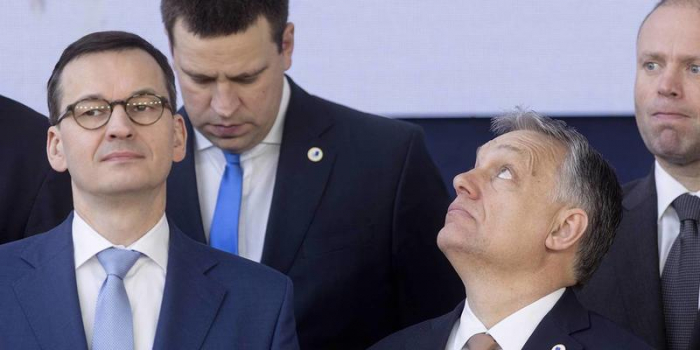In the European Union's leadership negotiations this month, populist governments failed not only to act as spoilers, but also to secure any concessions at all. They now have every reason to worry that they will be held accountable for their routine violations of the rule of law when EU funds are disbursed.
The conventional wisdom about European Commission President-elect Ursula von der Leyen’s confirmation by the European Parliament this month is that Central and Eastern European populists pushed her over the line. That is wrong. Had such parties actually backed her, von der Leyen’s margin of victory would have been much larger, considering the support she had from the center-right European People’s Party (EPP) and the liberals in the EU parliament.
True, populist MEPs from Poland’s Law and Justice (PiS) Party and Hungary’s Fidesz were firmly opposed to Frans Timmermans, a Dutch socialist who has loudly condemned both parties over their violations of EU norms and the rule of law. But nor did they want to strengthen French President Emmanuel Macron, who supported von der Leyen. The optimal outcome for Poland’s de facto ruler, Jarosław Kaczyński, and Hungarian Prime Minister Viktor Orbán was von der Leyen’s confirmation by the smallest possible majority. Populist MEPs thus appear to have been instructed to say they were voting for her without actually doing so.
Had von der Leyen lost, it would have been ample payback to the rejection of the PiS candidate for deputy speaker of the European Parliament and former Prime Minister Beata Szydło’s two failed bids to chair the Parliament’s Employment Committee. Moreover, this was around the same time that Krzysztof Szczerski, also backed by PiS, lost his bid to become Deputy Secretary General of NATO.
But, because von der Leyen made it through, the populists are boasting that she owes her job to them, as though they have some kind of tacit deal with the former German defense minister. That seems highly dubious, given that a deal between von der Leyen and PiS would have cost her the support of the socialists and liberals. But now that the populists have cast a shadow over her leadership, it is important to understand what they may want from her.
The first thing to recognize is that Central and Eastern Europe’s populists – now including the Czech government – would prefer to pursue intergovernmental negotiations than to work through the European Commission. Though the Commission usually goes out of its way to back the EU’s weaker members, populists, by definition, distrust institutions. They would rather install “the right people in the right positions,” and then strike a deal with them.
In the view of the Visegrád Four (Poland, Hungary, the Czech Republic, and Slovakia), the weaker the Commission, the better. The V4 governments are convinced that they will always reach agreements with Germany – with which their countries have deep economic and historical ties – more easily than with the EU.
The Visegrád countries didn’t even try to get their act together in the new parliament. Their approach to intra-EU relations is based not on building alliances or developing long-term strategies, but on wielding the veto. And yet, while PiS has the largest parliamentary delegation, with 26 seats, it belongs to the marginal European Conservatives and Reformists group. Fidesz has 13 seats, but is part of the EPP; and the Czech populist party ANO has six MEPs, but sits in the Renew Europe group.
Then again, the V4 has always functioned as an ad hoc coalition without a common strategic vision. This time, it didn’t even try to unite to block any of the leadership appointments. But the next test will come with budget negotiations, which is one area where the V4 has traditionally been able to form a plan and cooperate. Prior to an earlier budget negotiation, for example, Poland was able to secure Polish MEP Janusz Lewandowski’s position as EU Budget and Financial Programming Commissioner.
The problem this time is that the Visegrád populists will not have any allies in key positions. That means they could soon face a problem: the disbursement of EU funds will be made conditional on a recipient government’s respect for the rule of law. It isn’t yet clear where von der Leyen stands on this issue. But it is worth remembering that conditionality is a German idea, and that Germany is the largest source of EU funds.
Moreover, the V4 itself is divided on the question of whether EU funds should come with more strings attached. Hungary and Poland are staunchly opposed to the idea, of course; but the Czechs and the Slovaks have remained quiet, for fear of being thrown out of the Alliance of Liberals and Democrats for Europe or the Progressive Alliance of Socialists and Democrats. So, while the V4 governments might manage to negotiate jointly on local projects, the Czechs and Slovaks will probably stick closer to larger allies.
For Western Europeans, the fact that Eastern Europe got nothing in the leadership reshuffle is somewhat awkward. Most likely, the question of regional inclusion will be settled by making Laura Codruța Kövesi of Romania the head of the new European Public Prosecutor’s Office. But this, too, would represent another blow against populists. Having made a name for herself as an anti-corruption crusader at home, Codruța Kövesi now has Macron’s backing, following the withdrawal of a French candidate for the job.
Yet while von der Leyen is German, her victory is widely seen as a triumph for Macron. In the leadership negotiations, German Chancellor Angela Merkel couldn’t play the “Eastern European card” and demand that Old Europe offer the newer members some concessions to avoid offending them. The countries to Germany’s east have been offended for quite some time.
Sławomir Sierakowski, founder of the Krytyka Polityczna movement, is Director of the Institute for Advanced Study in Warsaw and Senior Fellow at the German Council on Foreign Relations.
Read the original article on project-syndicate.org.
More about: Europe
















































